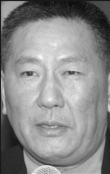By Albert Amateau
The first meeting of Community Board 2’s Chinatown Committee last week was hailed as a historic occasion and the beginning of a redress of past neglect of the Chinatown community.
Representatives from 15 Chinatown groups who were consulted in the formation of the committee came to the Wed., Sept. 5, meeting at P.S. 130 in the heart of Chinatown to talk about community concerns.
They spoke about the dwindling of affordable housing, the proliferation of bars and clubs, air pollution from Canal St. and Broome St. traffic, parking problems, the lack of jobs and the faltering economy since the World Trade Center attack and a lack of communication between Chinese-speaking residents and city agencies.
“Every day I walk through Chinatown,” said Eric Ng, president of the Chinese Consolidated Benevolent Association and unofficial mayor of the sprawling neighborhood that extends into the Community Board 1 and Community Board 3 districts, as well as Community Board 2. “Too many liquor licenses in the past 10 years. We want to make sure that restaurants seeking liquor licenses are not hiding the nature of their business,” he said. Ng was also concerned about the loss of parking space in the neighborhood since Sept. 11, 2001. He also faulted the city for granting too many permits to film companies that take over public streets and disrupt neighborhood business.
The prospect of a big, brassy burlesque club, Forty Deuce, at 19 Kenmare St., proposed by club impresario Ivan Kane with celebrity backing, inspired a group of opponents who urged that Community Board 2 rescind the approval it voted in April for a liquor license for the club.
“We’re fighting Forty Deuce and we’re writing to the S.L.A. [State Liquor Authority] for a hearing on the effect of the club on the neighborhood,” said Soon Ling Lai, director of the Chinatown Head Start program on Mott St. She declared that neighbors were prepared to pack a C.B. 2 Business Committee meeting scheduled for Sept. 11 to demand that the board reverse the liquor license recommendation it made in April.
Indeed, members of the new Chinatown Committee said they sympathized with opposition to Forty Deuce. They urged opponents to attend the monthly C.B 2 full board meeting on Sept. 20 to urge a reversal of the liquor license endorsement.
“Liquor licenses will be a recurring issue in the future,” said Ray Lee, chairperson of the C.B. 2 Business Committee and a member of the Chinatown Committee.
“We don’t need a big burlesque house — we don’t want Forty Deuce in our community,” said Virginia Kee, a former P.S. 130 teacher and longtime Chinatown advocate. Kee also told the meeting that she welcomed volunteer efforts to improve sanitation in the neighborhood. But she was opposed to formation of a business improvement district, which would impose an additional assessment on property owners to augment sanitation and business services.
“Many of the people who own little buildings have rent-regulated tenants and couldn’t afford an assessment,” Kee noted.
But John Leo, outreach director of the Chinatown Partnership, which coordinates a street-cleaning program, noted that the Lower Manhattan Development Corporation, the state-city agency created to deal with the economic impact of the World Trade Center attack, has ceased funding the partnership.
“It’s a seven-days-a-week program, and a really big job,” Leo said. “We can’t keep going to the L.M.D.C. to keep it going. We have to think of a permanent organization to sustain the program.”
Margaret Chin, deputy executive director of Asian Americans for Equality, said the shrinking pool of affordable housing was a major concern for Chinatown.
“We’re losing a lot of rent-stabilized units, not just in Community Board 2, but in Boards 1 and 3,” she said. “There are a lot of demolition evictions — a landlord on Baxter St. wants to tear down two buildings,” she noted. Moreover, landlords are leaving the federal Section 8 housing subsidy program, Chin said.
For David Chen, executive director of the Chinese American Planning Council, a key issue is the lack of access to information. Moreover, Chinatown is more than a place where people live, he said, noting, “It is also for the people who come here from all over the city.”
Po Ling Ng, director of the Project Open Door senior center and an advocate for Chinatown for 18 years, said that homeless seniors are a priority concern.
Zhi Qin Zheng, a 25-year resident of Chinatown and a member of the Chinatown Tenants Union, commented on the impact of gentrification on low-income residents, assisted by Helene Wong, a tenants union member who translated her remarks.
“Landlords kick us out so they can rent to people who can make more money,” Zheng said, adding that where she lives at 61 Delancey St., the landlord denies heat and hot water to the apartments and takes a long time to make repairs. Moreover, she said, the 311 city complaint line doesn’t have Chinese translators, and Chinese speakers cannot communicate with building inspectors.
Peter Cheng, executive director of the Indochina Sino-American Community Center, also said he was concerned that because of gentrification Chinatown will no longer be the home of immigrants.
Jim Solomon, chairperson of the Chinatown Committee, said the committee’s simple agenda was to listen and learn.
“Community Board 2 can and will do a better job regarding Chinatown,” Solomon said. He also said the board will consult with Boards 1 and 3 on Chinatown issues.
For most of the past decade, Ed Ma has been the sole Chinatown voice on C.B. 2. Ma declared that he was happy to see the whole neighborhood represented at the Sept. 5 event.
“This is a historic meeting that will help promote peace, prosperity and democracy,” he said.
thevillager.com




































